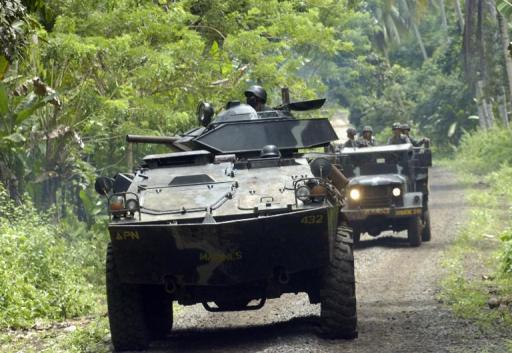Islamic militants on Monday massacred 21 people, including one child, who were travelling to a village feast in the southern Philippines to mark the end of Ramadan, the military said.
About 50 Abu Sayyaf gunmen opened fire on two vehicles in the remote town of Talipao on Jolo island, killing 21 people and wounding 11 others, regional military spokeswoman Marine Captain Rowena Muyuela told AFP.
"These were villagers who were travelling to a designated area to celebrate Hari Raya," she said, referring to the Muslim feast, also known as Eid al-Fitr, that ends Islam's holy fasting month of Ramadan.
A three-year-old boy and six policemen were among those killed in the attack, she said, while four other children were among the 11 wounded.
Muyuela said the militants appeared to have targeted the policemen, also local Muslims, who were aboard the convoy and travelling to the festivities in their personal capacities.
The shooting was the deadliest this year by the Al-Qaeda-linked Abu Sayyaf, which was founded in the 1990s with seed money from Osama bin Laden's Al-Qaeda network.

The group is blamed for the worst terrorist attacks in the Philippines' recent history.
These include the 2004 bombing of a ferry that left more than 100 dead, abductions of foreign missionaries and tourists, and beheadings mostly of local people.
Muyuela said a "military pursuit operation" was under way to catch the suspects, but soldiers had not caught up with them.
Jolo is one of the Abu Sayyaf's main strongholds, where militants are able to hide with relatives in the remote jungles of the mainly Muslim populated island.
The Abu Sayyaf is believed to be holding several hostages, including foreigners, on Jolo. Foreigners are warned not to travel to Jolo and nearby islands because of the threat of Abu Sayyaf kidnapping.
The Abu Sayyaf is just one of a number of guerrilla groups and warlords operating in the southern Philippines.
Fifty-eight people in the southern province of Maguindanao were killed in 2009 allegedly on the orders of a powerful political clan in what has been considered to be the worst case of election-related violence in the Philippines.
The attack was allegedly ordered by Andal Ampatuan Snr, a Muslim local political leader, and his sons to stop a rival from running against one of the family members for the governorship of the poor farming province.
More than a hundred suspects, including leaders of the Ampatuan clan, are already detained and many are on trial for the mass murder.
But dozens of suspects still remain at large while the slow pace of the trial has raised fears that witnesses could be intimidated or targeted by those who carried out the killings.













